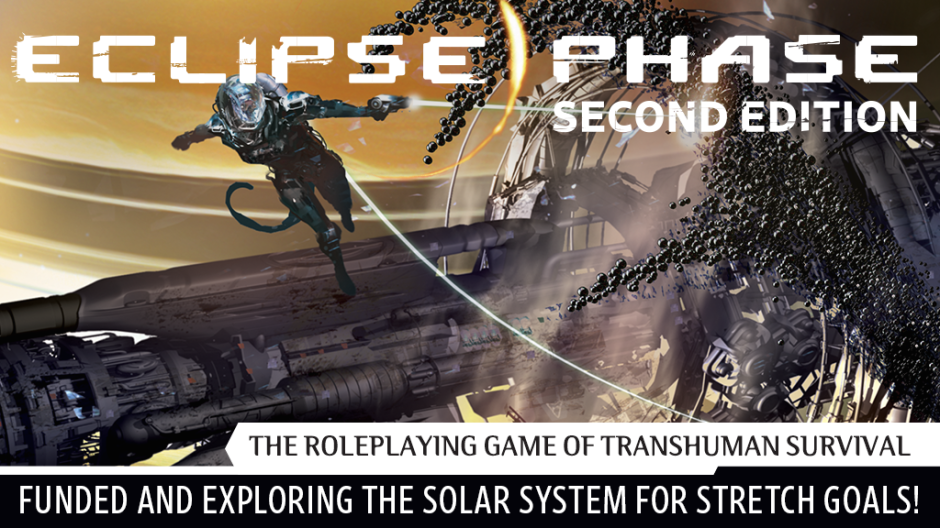I’m really psyched about the new Kickstarter for Eclipse Phase Second Edition, and if you are a fan of the game you are probably psyched too. If you aren’t, though, you might want to check out Renegade Octopus’s blog for some reasons to give it a look. For my two cents, just keep reading!
EP2 as the book is (inevitably) called, promises a few different things that sound pretty great. First of all, they are making the package system introduced in Transhuman the default option for character creation. This is pretty great for the game itself but I’m also hoping that they are keeping the point-buy system in some fashion since that allows for some fine-detail character creation for veteran players.
They are also doing a lot to encourage faster gameplay as well as faster chargen: reduced number of skills so you aren’t always searching through your sheet, a change to gear costs so that people will actually use the rep favor system, and streamlined systems for combat and hacking among others. If you’ve ever tried to hack something in Eclipse Phase you probably realized quickly that it needed a whole flowchart to keep the steps and conditions straight.

This is all awesome, but in a sense they are playing with fire. Was the old system perfect? No, not nearly. But was it fun and gritty? Yes. Hopefully the new systems involve all the detail-oriented gameplay that is integral to the complex setting and world of Eclipse Phase and we don’t end up with a watery, sloshy version instead.
The thing that has me most excited, though, is the list of stretch goals. We already have two unlocked, the freelancer bonus and NPC File Volume 2. I think it’s awesome that Posthuman Studios includes a freelancer bonus in all of their Kickstarters: it shows that they care and it speaks to me as a customer that there are people being actively motivated to make the best product they can. As for NPC File Vol. 2, I’ve been waiting years for this puppy and I’m practically salivating for it.
Next up is The Whispering Muse series that promises to feature topics “off the beaten path” in the Eclipse Phase universe. Examples they list include more information on Meathab, trends in Zero-G fashion, and the Ten Most Beautiful Sights in the Solar System. My predictions for other topics include sports, food, and birth… Which reminds me, I should wrap up my own thoughts on being born in Eclipse Phase.

After this is another freelancer bonus and then a Player’s Guide which promises to provide a lot of the new and interesting bits that we saw in Transhuman for the first edition. After that, your guess is as good as mine. Based on their stretch goals for Transhuman, I’m thinking these will include a few adventures (since they asked Caleb Stokes to write something because of Know Evil, maybe they’ll be tapping Ross Payton because of Duality) as well as another mini-book like Argonauts or Zone Stalkers (which both came out of the Transhuman Kickstarter).
In short, this is a great time to get into Eclipse Phase, not least because some of the stretch goals allow you to grab everything in the series at a cut-rate price. So hopefully I’ll see you among the backers!


One thing that could really use streamlining is the hacking system.
If there’s a nanofabricator and you want to modify it, you roll against your Hardware skill, and if you succeed it’s modified.
If there’s a computer you want to hack, first you need to think about authentication by spoofing or forgery, then you need to defeat the firewall, then the system might be actively monitored so you’ll need to try to avoid detection by deleting logs, then there are multiple levels of intruder status, and even once you’re in you differentiate whether you got in as a regular user, an elevated-security, or an admin account.
It’s both an incredibly over-detailed model of present-day hacking, and it also seems to assume that nothing has changed at all about computers since the invention of the future.
LikeLike
Another thing that could use more emphasis is simple skill checks.
Let’s say you’re standing still, shooting at an enemy the size of a broadside of a barn. You get +30 since the target is so big. You’re standing less than 2 meters from it, so that’s another +10. You have a skill of 30 in shooting, which according to the table on p.174 of the first edition main book, represents “some professional training” and much more than “basic proficiency”. That means you have a 70% chance of success. Standing still 2 meters away from a barn, somehow you miss 30% of the time against a target that in the real world would be physically extremely difficult to miss.
Besides which, a good percentage of the time, you’ll get critical failures and shoot yourself in the foot or break your gun or something. It’s like we’re Stormtroopers! I guess this could be a time to use the Simple Success Test, but if you can use that test for shooting guns the book sure doesn’t talk about it.
Some more emphasis could be placed on the simple success test, so that GM’s are more likely to use them frequently, to reduce the tendency of critical failures on overly-frequent skill checks to feel like Three Stooges in Space.
LikeLike
Agreed on both! Those branching flow charts of actions were amazingly intimidating.
LikeLike
Last point of feedback on first edition for now.
The reputation economy system never seemed correctly balanced.
Let’s say the players need to travel to an outer world, where the economy is based on reputation. Based on the prices on p.331, this would require egocasting (expensive), a body bank for your old body (moderate per month), maybe backup insurance (low to moderate per month). Also from p.280 you would need, resleeving (low), and a rental morph (1% of at least high per day). Let’s say you also need a gun, say an SMG (moderate), and a silencer (moderate). Also probably need at least one set of clothing (low). So based on the rules for using rep on p.287, each of these would require a Networking Test to even find someone who can provide these services. So there’s a chance if you fail a roll, you can’t even find someone who will sell you a basic set of clothing (another situation where simple success tests seem like they should be more emphasized). Then, according to the chart on p.289, you only get 1 expensive favor every 3 months and 1 moderate favor every week if you don’t burn your reputation. So just getting out to the outer world and getting basic gear would take months of game time to wait for favors to build up.
I think this imbalance is a big factor in why it seems like a lot of player groups, at least according to my casual observation, don’t seem to end up ego casting much, and end up sticking with morphs for longer than the rulebooks would seem to suggest they should.
LikeLike